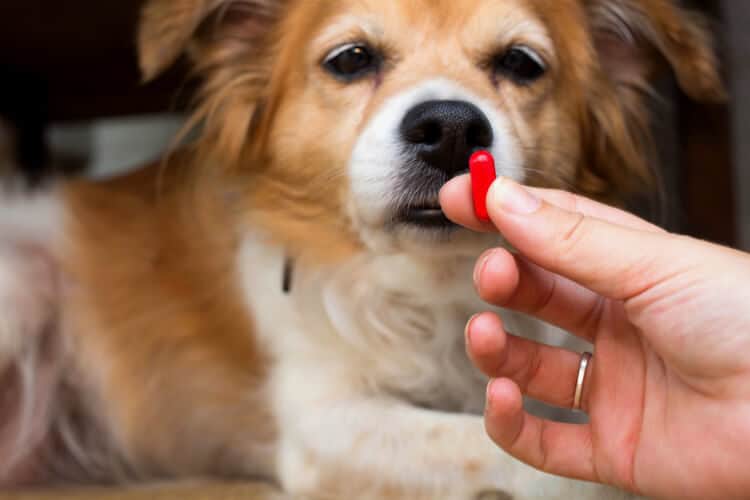People take probiotics for their intestinal health, but dogs can benefit from them, too. When the right types are given in the right amounts, these helpful microorganisms can keep your dog’s intestinal microbiome healthy. The question is—can dogs take human probiotics? The short answer is yes. However, there are distinct advantages to giving your dog species-specific probiotics instead of sharing yours.
What Are Probiotics?

Image courtesy of Unsplash
Probiotics are defined as “live microorganisms, which confer health effects to the host if administrated in sufficient amounts.”1 To break it down, probiotics are “good” bacteria or yeasts that are naturally found in the body. You’re not introducing something that’s not already perfectly at home in the intestines.
However, the digestive tracts of dogs and humans have some differences that make dog-specific probiotics a better choice than human versions. The differences start in the saliva. Dog saliva performs more antimicrobial functions, whereas the enzymes in human saliva function mainly to help break down food.23 While both species have acidic stomach environments, dog stomachs are more acidic than a human’s stomach. Dog intestines are also shorter than human intestines.
These key digestive features as well as dietary differences create a unique gut microbiome for each species. While human probiotics aren’t harmful to and can be helpful to dogs, they aren’t going to offer the same benefits as dog-specific probiotic strains.
Does My Dog Need Probiotics?
The gut microbiome helps digest food, but it does more than that. The intestine’s natural microbial population also contributes to immune system support and influences everything from weight management to allergies.4 Probiotics may benefit dogs prone to gastroenteritis, irritable bowel disease (IBD), and allergies.5 Dogs who struggle with any of these issues are candidates for daily probiotics. However, consult your veterinarian to determine if a specific strain might work better than another.
Sometimes an illness, antibiotic administration, or change in diet can alter the gut’s bacterial balance, leading to stomach upset, diarrhea, or other digestive issues. Changes in the gut microbiome can also reduce the effectiveness of the immune system, making the dog more susceptible to pathogens found in their environment or food. Probiotics put the good (bacteria) guys back in control.
Can Dogs Take Human Probiotics?
Yes, dogs can take human probiotics. The fact is that dogs and humans have coexisted together long enough that dogs often carry human strains of gut bacteria.6 For example, humans and dogs both have various strains of lactobacilli in their microbiome, and strains of canine and human bifidobacteria are found in the typical dog microbiome.
However, probiotics that are beneficial to humans may not be as beneficial to your dog as those designed specifically for them. Probiotics designed for dogs (and cats) are balanced for their microbiome and specific needs. Different strains of dog probiotics are also designed to address specific problems like diarrhea, immune system support, or even anxiety relief. You’ll get a better bang for your buck (financially and health-wise) by sticking with dog-specific varieties.
When & How to Give Canine Probiotics

Photo courtesy of Unsplash
A daily probiotic may be a good idea for your dog if:
- he’s prone to stomach problems
- he’s a curious eater who’ll eat anything and everything
- he has a chronic digestive problem like IBD or frequent gastroenteritis
- he’s been on antibiotics
- he could use an immune system boost
However, if your dog suddenly develops severe digestive issues, a probiotic isn’t the solution. That’s when it’s time to call the veterinarian to make sure that a serious problem isn’t developing. You also don’t need to give a separate probiotic if your dog’s food already contains probiotics.
Probiotics come in different forms, such as chews, powders, and gels. Picky dogs may need you to be a bit sneaky about giving probiotics by using a tasty chew or flavored powder to blend them in with their food. Dog probiotics also come in different strains designed to target specific problems. Give a strain that addresses your dog’s specific needs, such as digestive health, immune system support, or behavioral issues like anxiety. Follow the manufacturer’s directions to make sure the dog gets the right amount because excessive doses can cause diarrhea, bloating, and general discomfort.
Final Thoughts
People probiotics aren’t a bad idea in a pinch. They certainly won’t hurt your dog. However, like most things, the people version isn’t the best choice for dogs. Probiotics designed for dogs will offer the most benefits. If you’re unsure if your dog could benefit from probiotics, talk to your veterinarian. Managing your dog’s health is a partnership between the two of you. He or she may even recommend a brand and strain most likely to target your dog’s specific health issues.
Featured Image Credit: A-photographyy, Shutterstock
- Hill C, Guarner F, Reid G, et al. The International Scientific Association for Probiotics and Prebiotics consensus statement on the scope and appropriate use of the term probiotic. Nature Reviews Gastroenterology & Hepatology. 2014; 11: 506-514. Published June 10, 2014. Accessed March 20, 2021.
- Akpomie, OO, Ukoha P, Nwafor OE, Umukoro G. Saliva of different dog breeds as antimicrobial agents against microorganisms isolated from wound infections. Animal Science Journal. 2011; 2(1): 18-22. Published 2011. Accessed April 22, 2021.
- Malmquist S and Prescott K. Human biology. Open.lib.umn.edu Accessed April 22, 2021.
- Tizard I. The role of microbiota in animals. Merckvetmanual.com Updated May 2020. Accessed April 21, 2021.
- Grzeskowiak L, Endo A, Beasley S. Salminen S. Microbiota and probiotics in canine and feline welfare. Anaerobe. 2015; 34(August): 14-23. doi: 10.1016/j.anaerobe.2015.04.002
- Jang HJ, Son S, Kim JA, et al. Characterization and functional test of canine probiotics. Frontiersin.org. Published March 8, 2021. Accessed April 21, 2021.














